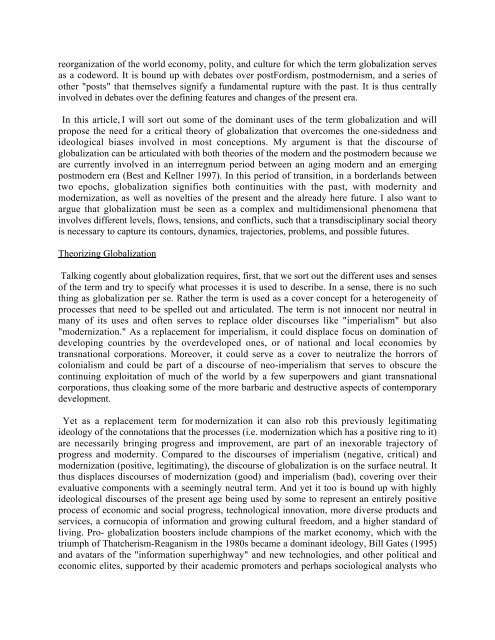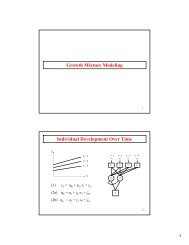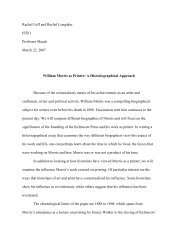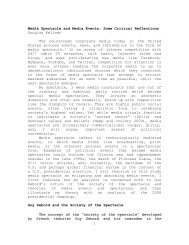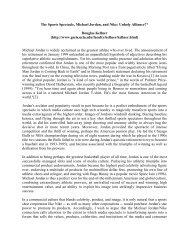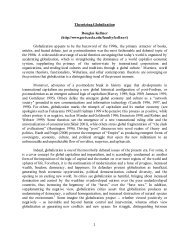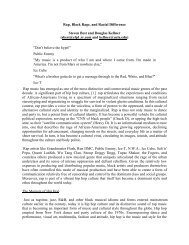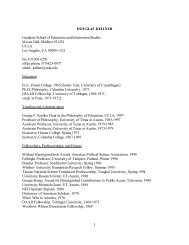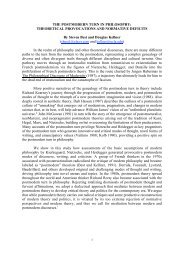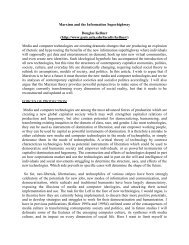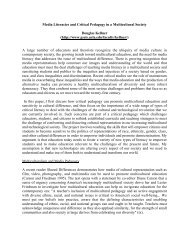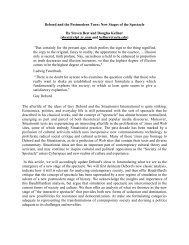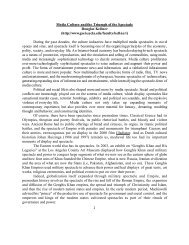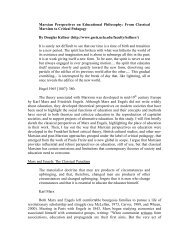Globalization and the Postmodern Turn By Douglas Kellner ... - UCLA
Globalization and the Postmodern Turn By Douglas Kellner ... - UCLA
Globalization and the Postmodern Turn By Douglas Kellner ... - UCLA
Create successful ePaper yourself
Turn your PDF publications into a flip-book with our unique Google optimized e-Paper software.
eorganization of <strong>the</strong> world economy, polity, <strong>and</strong> culture for which <strong>the</strong> term globalization serves<br />
as a codeword. It is bound up with debates over postFordism, postmodernism, <strong>and</strong> a series of<br />
o<strong>the</strong>r "posts" that <strong>the</strong>mselves signify a fundamental rupture with <strong>the</strong> past. It is thus centrally<br />
involved in debates over <strong>the</strong> defining features <strong>and</strong> changes of <strong>the</strong> present era.<br />
In this article, I will sort out some of <strong>the</strong> dominant uses of <strong>the</strong> term globalization <strong>and</strong> will<br />
propose <strong>the</strong> need for a critical <strong>the</strong>ory of globalization that overcomes <strong>the</strong> one-sidedness <strong>and</strong><br />
ideological biases involved in most conceptions. My argument is that <strong>the</strong> discourse of<br />
globalization can be articulated with both <strong>the</strong>ories of <strong>the</strong> modern <strong>and</strong> <strong>the</strong> postmodern because we<br />
are currently involved in an interregnum period between an aging modern <strong>and</strong> an emerging<br />
postmodern era (Best <strong>and</strong> <strong>Kellner</strong> 1997). In this period of transition, in a borderl<strong>and</strong>s between<br />
two epochs, globalization signifies both continuities with <strong>the</strong> past, with modernity <strong>and</strong><br />
modernization, as well as novelties of <strong>the</strong> present <strong>and</strong> <strong>the</strong> already here future. I also want to<br />
argue that globalization must be seen as a complex <strong>and</strong> multidimensional phenomena that<br />
involves different levels, flows, tensions, <strong>and</strong> conflicts, such that a transdisciplinary social <strong>the</strong>ory<br />
is necessary to capture its contours, dynamics, trajectories, problems, <strong>and</strong> possible futures.<br />
Theorizing <strong>Globalization</strong><br />
Talking cogently about globalization requires, first, that we sort out <strong>the</strong> different uses <strong>and</strong> senses<br />
of <strong>the</strong> term <strong>and</strong> try to specify what processes it is used to describe. In a sense, <strong>the</strong>re is no such<br />
thing as globalization per se. Ra<strong>the</strong>r <strong>the</strong> term is used as a cover concept for a heterogeneity of<br />
processes that need to be spelled out <strong>and</strong> articulated. The term is not innocent nor neutral in<br />
many of its uses <strong>and</strong> often serves to replace older discourses like "imperialism" but also<br />
"modernization." As a replacement for imperialism, it could displace focus on domination of<br />
developing countries by <strong>the</strong> overdeveloped ones, or of national <strong>and</strong> local economies by<br />
transnational corporations. Moreover, it could serve as a cover to neutralize <strong>the</strong> horrors of<br />
colonialism <strong>and</strong> could be part of a discourse of neo-imperialism that serves to obscure <strong>the</strong><br />
continuing exploitation of much of <strong>the</strong> world by a few superpowers <strong>and</strong> giant transnational<br />
corporations, thus cloaking some of <strong>the</strong> more barbaric <strong>and</strong> destructive aspects of contemporary<br />
development.<br />
Yet as a replacement term for modernization it can also rob this previously legitimating<br />
ideology of <strong>the</strong> connotations that <strong>the</strong> processes (i.e. modernization which has a positive ring to it)<br />
are necessarily bringing progress <strong>and</strong> improvement, are part of an inexorable trajectory of<br />
progress <strong>and</strong> modernity. Compared to <strong>the</strong> discourses of imperialism (negative, critical) <strong>and</strong><br />
modernization (positive, legitimating), <strong>the</strong> discourse of globalization is on <strong>the</strong> surface neutral. It<br />
thus displaces discourses of modernization (good) <strong>and</strong> imperialism (bad), covering over <strong>the</strong>ir<br />
evaluative components with a seemingly neutral term. And yet it too is bound up with highly<br />
ideological discourses of <strong>the</strong> present age being used by some to represent an entirely positive<br />
process of economic <strong>and</strong> social progress, technological innovation, more diverse products <strong>and</strong><br />
services, a cornucopia of information <strong>and</strong> growing cultural freedom, <strong>and</strong> a higher st<strong>and</strong>ard of<br />
living. Pro- globalization boosters include champions of <strong>the</strong> market economy, which with <strong>the</strong><br />
triumph of Thatcherism-Reaganism in <strong>the</strong> 1980s became a dominant ideology, Bill Gates (1995)<br />
<strong>and</strong> avatars of <strong>the</strong> "information superhighway" <strong>and</strong> new technologies, <strong>and</strong> o<strong>the</strong>r political <strong>and</strong><br />
economic elites, supported by <strong>the</strong>ir academic promoters <strong>and</strong> perhaps sociological analysts who


